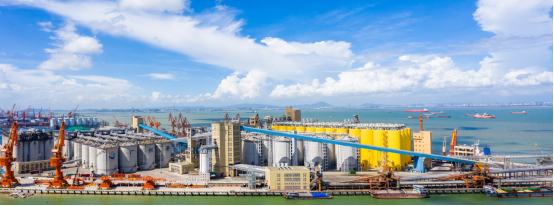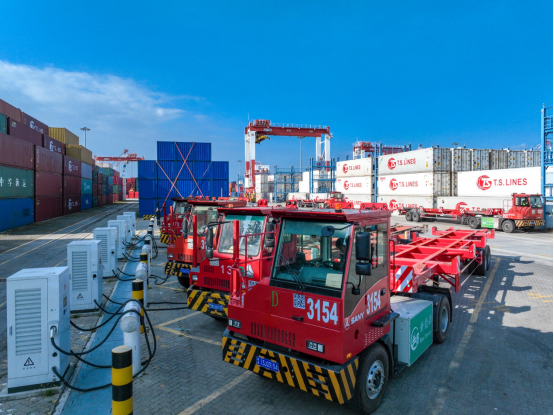In Guangzhou, China, there is a port company called Guangzhou Port Company Limited, which is celebrating its 20th anniversary this year. Through two decades of development, the company has developed Guangzhou Port into a globally recognized port, ranking among the top ten ports in terms of cargo throughput and container handling.
It has become a crucial transportation hub for energy, raw materials, and goods circulation between the north and south of China, serving as the largest comprehensive main hub port in South China. This company has also become an important force in the development of the Guangdong-Hong Kong-Macao Greater Bay Area (GBA) port cluster.
The integration of port and urban development is a crucial topic for Guangzhou's development. In this regard, three experts have provided recommendations from different perspectives.

Zheng Yongnian, Dean of the Qianhai Institute of International Affairs, has long been engaged in studying the situation in the GBA. "China's journey to becoming a maritime power is not only an important backdrop but also a great opportunity for the significant development of Guangzhou," Zheng Yongnian stated. Furthermore, he emphasized that amid the unprecedented changes of the era, the external circulation strategy has received strong attention. With the signing of the RCEP and the implementation of the Belt and Road Initiative, Guangzhou, as the open door of China, must seize the conditions for further opening up and internal reforms. This will enhance Guangzhou's economic functions and status within the global urban system.
"I propose that the China-ASEAN Free Trade Area should be upgraded to a China-ASEAN Common Market, and Guangzhou should leverage its maritime heritage, particularly the traditional Maritime Silk Road, to take a leading role in building the China-ASEAN Common Market," Zheng said.
He also argues that Guangzhou must exert more effort to expand its presence through oceanic channels, promote institutional openness, and export Chinese rules to the world. China should realize that rules are the fundamental basis of productivity, which is crucial for China's journey toward becoming a strong nation.

Qiu Guoxuan, executive director of the Guangdong-Hong Kong-Macao Greater Bay Area Supply Chain Research Institute, provided suggestions from the perspective of the development of port industries in Guangzhou.
"It is crucial to strengthen the development of an inland dry port network to expand the economic hinterland of Guangzhou Port," said Qiu, who has focused on the importance of inland ports. He said that inland dry ports serve as vital nodes connecting coastal ports with inland regions in terms of logistics, trade, and supply chains.
"I would recommend that Guangzhou Port focuses on leveraging the Belt and Road Initiative, the Pearl River system, and railway hubs. Based on factors such as local cargo sources, segmented market trends, and transportation distances, priority should be given to the regions of eastern and northern Guangdong, as well as Yunnan, Guizhou, Hunan, Guangxi, Chongqing, and Jiangxi." In Qiu’s opinion, efforts should be accelerated to expedite the development and layout of inland dry ports in these areas.
Besides, Qiu also suggested that Guangzhou Port should be positioned as the main stronghold of the world-class port cluster in the Greater Bay Area by making use of the advantages of the Nansha District's location. The development focus of international trade routes should focus on the shipping market in Southeast Asia and countries along the Belt and Road Initiative. It is necessary to expand the existing logistics pattern advantages, establish a differentiated layout in coordination with Shenzhen and Hong Kong and reduce excessive competition in European and American shipping routes.

Chen Guanghan is the chief expert of the Institute of Guangdong, Hong Kong and Macao Development Studies of Sun Yat-sen University. He emphasizes the necessity of enhancing the urban functions of Guangzhou and establishing a new positioning for urban development. In addition, he argues that leveraging the strategic industries based on port development, Nansha can focus on developing strategic emerging industries, with a particular emphasis on new-generation information technology and new energy vehicles, and establish a development zone for the marine technology industry. By leveraging the port, the Guangzhou Nansha Economic Zone should be constructed to achieve deep integration of port, industry, and city, facilitating industrial innovation and upgrading, and creating a new growth pole for the development of Guangzhou.
Chen also holds the point that Guangzhou can play a significant role in connecting both the domestic and international markets and utilizing resources from both. The Guangzhou Port Economic Zone, based on Nansha and Huangpu's industrial foundations, should optimize the layout of the port and shipping industry, harnessing the scale effect of the port and shipping industry, and expanding the role of the port in providing a foundation and driving force for the city's economic and social development.
Reporter | Yiqing Wang, Shiqiang Liu
Editor| Nan, Will, Holly, James

















